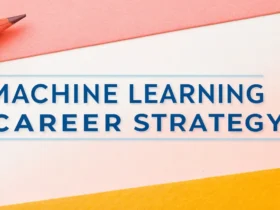Data science. The words alone can conjure images of complex algorithms, endless lines of code, and futuristic innovations. It’s a field that’s rapidly transforming industries and shaping the future. You might be thinking, “Is a career in data science right for me?”. If you are a college student contemplating a data science career, you’re likely wondering what skills are most vital for success.
Landing a job in this dynamic field demands more than just textbook knowledge. It requires a blend of technical expertise, analytical thinking, and crucial soft skills. This article will explore the essential skills you’ll need to thrive in the world of data science. We will delve into the technical skills, explore the soft skills needed, and provide tips on how to showcase them.
Technical Skills are the Cornerstone of Data Science
Data science is built on a foundation of technical skills. These skills are the tools you’ll use to collect, clean, analyze, and interpret data. While the specific tools and technologies may evolve, the underlying principles remain constant.
Programming Languages: Python and R
Python and R are the dominant programming languages in the data science world. Python’s versatility and extensive libraries make it ideal for various tasks, from data manipulation to machine learning. R, with its statistical computing focus, excels in data analysis and visualization.
-
Why Python? Python boasts a large and active community, along with libraries such as NumPy, pandas, scikit-learn, and TensorFlow. These libraries simplify complex tasks, allowing you to focus on problem-solving rather than low-level coding.
-
Why R? R is tailor-made for statistical analysis. Its rich ecosystem of packages, such as ggplot2 for visualization and dplyr for data manipulation, makes it a favorite among statisticians and data analysts.
-
Learning Path: Start with the basics of syntax, data structures, and control flow. Practice by working on small projects, such as analyzing a public dataset or building a simple predictive model. Online courses, tutorials, and coding bootcamps can provide structured learning paths.
Statistical Analysis: Understanding Data
Statistical analysis is the bedrock of data science. You need to understand statistical concepts to make sense of data, draw valid conclusions, and build reliable models.
-
Key Concepts: Descriptive statistics (mean, median, standard deviation), inferential statistics (hypothesis testing, confidence intervals), regression analysis, and probability distributions are essential.
-
Practical Application: Learn how to apply statistical techniques using Python or R. Understand how to interpret the results of statistical tests and communicate your findings effectively.
-
Resources: Introductory statistics textbooks, online courses, and statistical software packages (e.g., SPSS, SAS) can help you build a solid foundation.
Machine Learning: Building Predictive Models
Machine learning (ML) is a subset of artificial intelligence (AI) that focuses on enabling computers to learn from data without explicit programming. ML algorithms can identify patterns, make predictions, and automate complex tasks.
-
Core Algorithms: Linear regression, logistic regression, decision trees, support vector machines (SVMs), and neural networks are fundamental ML algorithms.
-
Model Evaluation: Learn how to evaluate the performance of ML models using metrics such as accuracy, precision, recall, and F1-score. Understand the concepts of overfitting and underfitting and how to prevent them.
-
Frameworks: Scikit-learn in Python provides a comprehensive set of tools for building and evaluating ML models. TensorFlow and PyTorch are popular deep learning frameworks.
Data Visualization: Telling Stories with Data
Data visualization is the art of presenting data in a graphical format to reveal insights, trends, and patterns. Effective visualizations can communicate complex information clearly and concisely.
-
Visualization Tools: Matplotlib and Seaborn in Python, and ggplot2 in R, are powerful visualization libraries. Tableau and Power BI are popular business intelligence (BI) tools for creating interactive dashboards and reports.
-
Design Principles: Learn the principles of visual design, such as choosing the right chart type, using color effectively, and avoiding clutter.
-
Storytelling: Master the art of data storytelling by crafting narratives that highlight key insights and engage your audience.
Database Management: Handling Large Datasets
Data scientists often work with large datasets stored in databases. Knowing how to manage and query databases is crucial for extracting and preparing data for analysis.
-
SQL: Structured Query Language (SQL) is the standard language for interacting with relational databases. You need to know how to write SQL queries to retrieve, filter, and aggregate data.
-
NoSQL Databases: NoSQL databases (e.g., MongoDB, Cassandra) are designed to handle unstructured or semi-structured data. Understanding NoSQL concepts and query languages can be valuable.
-
Data Warehousing: Learn about data warehousing concepts, such as ETL (extract, transform, load) processes and data modeling.
Big Data Technologies: Processing Massive Datasets
When dealing with massive datasets that exceed the capacity of traditional databases, you’ll need to use big data technologies. These technologies enable distributed processing and storage of data.
-
Hadoop: Hadoop is a framework for distributed storage and processing of large datasets. It uses the MapReduce programming model to parallelize computations.
-
Spark: Spark is a fast and versatile engine for big data processing. It supports various programming languages (Python, Java, Scala) and provides libraries for ML, graph processing, and stream processing.
-
Cloud Platforms: Cloud platforms such as Amazon Web Services (AWS), Microsoft Azure, and Google Cloud Platform (GCP) offer a range of big data services, including data storage, data processing, and ML.
Soft Skills are the Differentiators
Technical skills provide the foundation, but soft skills are what set successful data scientists apart. These skills enable you to communicate effectively, collaborate with others, and solve complex problems creatively.
Communication: Conveying Insights Clearly
Communication is paramount in data science. You need to be able to explain your findings and recommendations to both technical and non-technical audiences.
-
Verbal Communication: Practice presenting your work in a clear and concise manner. Learn how to tailor your message to your audience and avoid technical jargon when speaking to non-technical stakeholders.
-
Written Communication: Master the art of writing reports, presentations, and emails that effectively communicate your insights.
-
Active Listening: Develop active listening skills to understand the needs and concerns of your stakeholders.
Problem-Solving: Tackling Complex Challenges
Data science is all about solving problems using data. You need to be able to approach complex challenges systematically and creatively.
-
Critical Thinking: Develop critical thinking skills to analyze problems, identify assumptions, and evaluate potential solutions.
-
Analytical Skills: Hone your analytical skills to break down complex problems into smaller, manageable components.
-
Creativity: Embrace creativity to generate novel solutions and think outside the box.
Teamwork and Collaboration: Working Effectively with Others
Data science projects often involve cross-functional teams. You need to be able to work effectively with people from different backgrounds and with different skill sets.
-
Collaboration Tools: Familiarize yourself with collaboration tools such as Slack, Microsoft Teams, and project management software.
-
Conflict Resolution: Learn how to resolve conflicts constructively and maintain positive working relationships.
-
Empathy: Develop empathy to understand the perspectives of your team members and stakeholders.
Business Acumen: Understanding the Business Context
Data science projects should align with business goals. You need to understand the business context and how your work contributes to the bottom line.
-
Industry Knowledge: Develop a general understanding of the industry you’re working in.
-
Key Performance Indicators (KPIs): Learn about KPIs and how to measure the impact of your data science projects.
-
Stakeholder Management: Build relationships with stakeholders and understand their needs and expectations.
Curiosity and Continuous Learning: Staying Ahead of the Curve
Data science is a rapidly evolving field. You need to be curious and committed to continuous learning to stay ahead of the curve.
-
Stay Updated: Follow industry blogs, attend conferences, and take online courses to keep abreast of the latest trends and technologies.
-
Experimentation: Embrace experimentation and be willing to try new things.
-
Growth Mindset: Cultivate a growth mindset and believe that your abilities can be developed through dedication and hard work.
Showcase Your Skills
Having the right skills is one thing, but being able to demonstrate them to potential employers is another. Here are some tips on how to showcase your data science skills:
Build a Portfolio: Demonstrate Your Abilities
A portfolio is a collection of projects that demonstrate your data science skills. It’s one of the best ways to show potential employers what you’re capable of.
-
Variety: Include a variety of projects that showcase different skills and techniques.
-
Real-World Problems: Focus on projects that solve real-world problems.
-
Clear Documentation: Provide clear documentation for each project, including a description of the problem, the methods used, and the results obtained.
Contribute to Open Source: Enhance Your Visibility
Contributing to open-source projects is a great way to improve your skills, collaborate with other data scientists, and enhance your visibility.
-
GitHub: Create a GitHub profile and contribute to projects that align with your interests and skills.
-
Documentation: Contribute to project documentation to help other users understand how to use the software.
-
Bug Fixes: Fix bugs and submit pull requests to contribute code improvements.
Network: Connect with Industry Professionals
Networking can help you learn about job opportunities, gain insights into the industry, and build relationships with potential employers.
-
Attend Conferences: Attend data science conferences and meetups.
-
Online Communities: Join online communities such as LinkedIn groups and Reddit forums.
-
Informational Interviews: Conduct informational interviews with data scientists to learn about their experiences and career paths.
Tailor Your Resume and Cover Letter: Highlight Relevant Skills
Customize your resume and cover letter for each job you apply for. Highlight the skills and experiences that are most relevant to the specific position.
-
Keywords: Use keywords from the job description in your resume and cover letter.
-
Quantifiable Results: Quantify your accomplishments whenever possible.
-
Highlight Projects: Highlight your most impressive projects in your resume.
Prepare for Technical Interviews: Ace the Assessment
Technical interviews are a common part of the data science hiring process. Prepare for these interviews by practicing coding problems, reviewing statistical concepts, and brushing up on your knowledge of ML algorithms.
-
Coding Challenges: Practice coding challenges on platforms such as LeetCode and HackerRank.
-
Statistical Questions: Review statistical concepts and be prepared to answer questions about hypothesis testing, regression analysis, and probability distributions.
-
ML Questions: Brush up on your knowledge of ML algorithms and be prepared to discuss their strengths and weaknesses.
Tips for College Students
Here are some specific tips for college students interested in pursuing a data science career:
-
Choose the Right Courses: Select courses that provide a strong foundation in mathematics, statistics, computer science, and domain knowledge.
-
Get Involved in Research: Participate in research projects to gain hands-on experience in data analysis and ML.
-
Seek Internships: Internships provide valuable real-world experience and can help you build your network.
-
Join Data Science Clubs: Join data science clubs to connect with other students and learn about the field.
-
Attend Workshops and Seminars: Attend workshops and seminars to learn about the latest trends and technologies in data science.
Is Data Science Worth It?
For many people, the answer is a resounding yes.
Data science jobs can be highly lucrative, with salaries often exceeding those in other fields. The demand for skilled data scientists is high, and the job market is expected to grow in the coming years.
Data science offers the opportunity to work on challenging and meaningful problems. You can use your skills to make a difference in a variety of industries, from healthcare to finance to environmental conservation.
A career in data science can be intellectually stimulating and personally rewarding. You’ll have the opportunity to learn new things, solve complex problems, and make a positive impact on the world. It demands both continuous learning and a passion for problem solving. But with dedication and the right skills, you can build a successful and fulfilling data science career.















Leave a Reply
View Comments